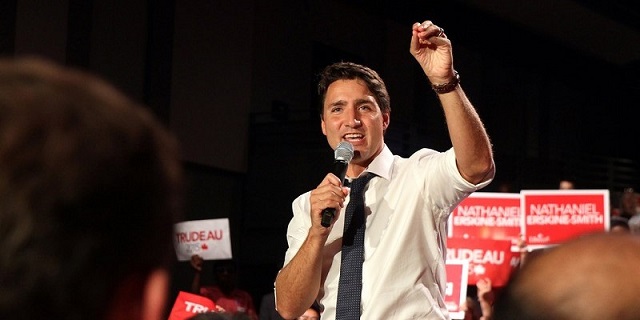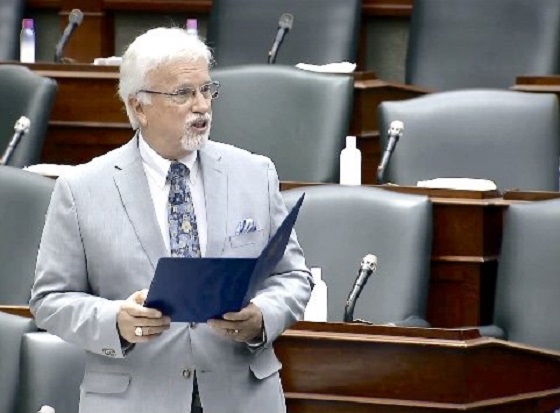National
Canada’s Governor General slammed for hosting partisan event promoting Trudeau’s ‘hate speech’ bill

From LifeSiteNews
Mary Simon, Canada’s supposed non-partisan head of state, appeared to be supporting a Liberal government bill that will further regulate the internet.
Governor General Mary Simon, who serves as Canada’s official non-partisan head of state and representative of King Charles III, has taken heat for hosting a conference supporting a new federal government bill that could lead to large fines or jail time for vaguely defined online “hate speech” infractions.
On April 11, Simon hosted an event titled “The Governor General’s Symposium: Building a Safe and Respectful Digital World” at her Rideau Hall residence, with the goal to “bring together individuals who experience online violence and experts from across the country to share their experiences, explore solutions, and create allyship and networks of resilience.”
The guest list for those invited included those supportive of Liberal Minster Attorney General Arif Virani’s Bill C-63, or Online Harms Act. Some of the invited guests included former Global News reporter Rachel Gilmore, LGBTQ activist Fae Johnstone, Chief Public Health Officer Dr. Theresa Tam, and Ottawa school trustee Nili Kaplan-Myrth. No members of the Conservative Party or independent journalists were invited.
After news spread of the event, which Simon herself posted about on X, many took to social media to voice concerns over Simon hosting the event.
“Can you imagine the Queen having a seminar at Buckingham Palace to talk about a bill before the House of Commons in England? That would be outrageous. That’s what @GGCanada Mary Simon just did,” said political commentator Tom Korski on a CBC radio show.
Another X user @IMHeatherAmI wrote, “Trudeau has corrupted everything.GG Mary Simon is abusing her power by “promoting contentious Liberal bills that are trying to be passed in Parliament.”
Rideau Hall gave no comment that Canada’s supposed non-partisan head of state appeared to be supporting a Liberal government bill that will further regulate the internet.
“The Governor General is non-partisan and apolitical,” Rideau Hall said in a statement.
In comments sent to the media about apparent conflicts of interest, a spokesperson for Simon said that she will keep advocating for “digital respect.”
Conservative Party spokesman Sebastian Skamski observed that Simon should be “ashamed” for “politicizing and exploiting” the office of Governor General, which is supposed to be completely non-partisan.
The Online Harms Act was introduced in the House of Commons on February 26 by Virani and was immediately blasted by constitutional experts as troublesome.
Bill C-63 will modify existing laws, amending the Criminal Code as well as the Canadian Human Rights Act, in what the Liberals claim will target certain cases of internet content removal, notably those involving child sexual abuse and pornography.
However, the bill also seeks to police “hate” speech online with broad definitions, severe penalties, and dubious tactics.
Details of the new legislation to regulate the internet show the bill could lead to more people jailed for life for “hate crimes” or fined $50,000 and jailed for posts that the government defines as “hate speech” based on gender, race, or other categories.
The bill also calls for the creation of a digital safety commission, a digital safety ombudsperson, and a digital safety office.
The Justice Centre for Constitutional Freedoms (JCCF) has said Bill C-63 is “the most serious threat to free expression in Canada in generations. This terrible federal legislation, Bill C -63, would empower the Canadian Human Rights Commission to prosecute Canadians over non-criminal hate speech.”
JCCF president John Carpay recently hand-delivered a petition with 55,000-plus signatures to Canada’s Minister of Justice and all MPs.
Economy
Young Canadians are putting off having a family due to rising cost of living, survey finds

From LifeSiteNews
An April study has found that 42% of Gen Z and 39% of Millennials are putting off starting families due to a lack of work-life balance spurred by an increase in the cost of living.
A survey has found that more Canadians are delaying starting a family due to a lack of work-life balance spurred by the rising cost of living.
According to an April 24 Express Employment Professionals-Harris Poll survey, one-third of employed job seekers stated that they are putting off starting a family due to a lack of work-life balance, including 42% of Gen Z and 39% of Millennials.
“The most common thing I hear from candidates who are putting off starting a family is that the cost of living is too high,” Jessica Culo, an Express franchise owner in Edmonton, Alberta stated.
“We definitely hear more and more that candidates are looking for flexibility, and I think employers understand family/work balance is important to employees,” she added.
Two-thirds of respondents further stated that they believe it’s essential that the company they work for prioritizes giving its employees a good work-life balance as they look to start a family. This included 77% of Gen Z and 72% of Millennials.
The survey comes as Canada’s fertility rate hit a record-low of 1.33 children per woman in 2022. According to the data collected by Statistics Canada, the number marks the lowest fertility rate in the past century of record keeping.
Sadly, while 2022 experienced a record-breaking low fertility rate, the same year, 97,211 Canadian babies were killed by abortion.
Canadians’ reluctance or delay to have children comes as young Canadians seem to be beginning to reap the effects of the policies of Prime Minister Justin Trudeau’s government, which has been criticized for its overspending, onerous climate regulations, lax immigration policies, and “woke” politics.
In fact, many have pointed out that considering the rising housing prices, most Canadians under 30 will not be able to purchase a home.
Similarly, while Trudeau sends Canadians’ tax dollars oversees and further taxes their fuel and heating, Canadians are struggling to pay for basic necessities including food, rent, and heating.
A September report by Statistics Canada revealed that food prices are rising faster than the headline inflation rate – the overall inflation rate in the country – as staple food items are increasing at a rate of 10 to 18 percent year-over-year.
While the cost of living has increased the financial burden of Canadians looking to rear children, the nation’s child benefit program does provide some relief for those who have kids.
Under the Canadian Revenue Agency’s benefit, Canadians families are given a monthly stipend depending on their family income and situation. Each province also has a program to help families support their children.
Young Canadians looking to start a family can use the child and family benefits calculator to estimate the benefits which they would receive.
Regardless of the cost of raising children, the Catholic Church unchangeably teaches that it is a grave sin for married couples to frustrate the natural ends of the procreative act through contraceptives, abortion or other means.
Such wisdom has even bled into the mainstream in recent years, with non-Catholic pundits like America’s Tucker Carlson advocating that young people “Get married when you’re too young, have more kids than you can afford, take a job you’re not qualified for, live boldly.”
Economy
Today’s federal government—massive spending growth and epic betting

From the Fraser Institute
One can legitimately ask whether the federal government has simply grown too big, complex and unwieldy to be managed at all
The Trudeau government’s 2024 budget landed with a thud, evoking little enthusiasm and drawing spirited criticism from business leaders, investors, provincial premiers and (of course) the opposition parties. Several elements of the budget have garnered outsized attention, notably the pledge to run endless deficits, the imposition of higher capital gains taxes, and various new programs and policy initiatives intended to address Canada’s housing crisis.
But the budget includes a few eye-catching data points that have been downplayed in the subsequent political and media commentary.
One is the sheer size of the government. The just-completed fiscal year marked a milestone, as Ottawa’s total spending reached half a trillion dollars ($498 billion, to be exact, excluding “actuarial losses”). According to the budget, the government will spend $95 billion more in 2024-25 than it planned only three years ago, underscoring the torrid pace of spending growth under Prime Minister Trudeau.
One can legitimately ask whether the federal government has simply grown too big, complex and unwieldy to be managed at all, even if we assume the politicians in charge truly care about sound management. How many parliamentarians—or even cabinet ministers—have a sufficient understanding of the sprawling federal apparatus to provide meaningful oversight of the vast sums Ottawa is now spending?
The ArriveCAN scandal and chronic problems with defence procurement are well-known, but how good a job is the government doing with routine expenditure programs and the delivery of services to Canadians? The auditor general and the Parliamentary Budget Officer provide useful insights on these questions, but only in a selective way. Parliament itself tends to focus on things other than financial oversight, such as the daily theatre of Question Period and other topics conducive to quick hits on social media. Parliament isn’t particularly effective at holding the government to account for its overall expenditures, even though that ranks among its most important responsibilities.
A second data point from the budget concerns the fast-rising price tag for what the federal government classifies as “elderly benefits.” Consisting mainly of Old Age Security and the Guaranteed Income Supplement, these programs are set to absorb $81 billion of federal tax dollars this year and $90 billion by 2026-27, compared to $69 billion just two years ago. Ottawa now spends substantially more on income transfers to seniors than it collects in GST revenues. At some point, a future government may find it necessary to reform elderly benefit programs to slow the relentless cost escalation.
Finally, the budget provides additional details on the Trudeau government’s epic bet that massive taxpayer-financed subsidies will kickstart the establishment of a major, commercially successful battery and electric vehicle manufacturing “supply chain” in Canada. The government pledges to allocate “over $160 billion” to pay for its net-zero economic plan, including $93 billion in subsidies and incentives for battery, EV and other “clean” industries through 2034-35. This spending, the government insists, will “crowd in more private investment, securing Canada’s leadership” in the clean economy.
To say this is a high-risk industrial development strategy is an understatement. Canada is grappling with an economy-wide crisis of lagging business investment and stagnant productivity. Faced with this, the government has chosen to direct hitherto unimaginable sums to support industries that make up a relatively small slice of the economy. Even if the plan succeeds, it won’t do much to address the bigger problems of weak private-sector investment and slumping productivity growth.
Author:
-

 Education10 hours ago
Education10 hours agoSupport a young reader through the Tim Hortons Smile Cookie campaign
-

 Alberta1 day ago
Alberta1 day agoAlberta’s vision for passenger rail
-

 RCMP1 day ago
RCMP1 day agoRed Deer RCMP arrest two individuals following ramming of police vehicle
-

 COVID-192 days ago
COVID-192 days agoFormer Canadian lawmaker has no regrets about refusing COVID shot despite losing his job
-

 COVID-192 days ago
COVID-192 days agoPeckford: Hallelujah! Supreme Court of Canada to hear Newfoundland and Labrador charter case
-

 Education1 day ago
Education1 day agoRebels earn Jim Donlevy Memorial Trophy as WHL Scholastic Team of the Year
-

 John Stossel1 day ago
John Stossel1 day agoWhy Biden’s Just Wrong: NO ONE “Knows How to Make Government Work.”
-

 Alberta1 day ago
Alberta1 day agoThree Calgary massage parlours linked to human trafficking investigation







